Smartchoices
On this page, you find all documents, package deals, and flashcards offered by seller smartchoices.
- 1536
- 0
- 121
Community
- Followers
- Following
1 Reviews received
1662 items
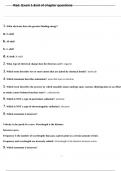
Rad. Exam 1-End of chapter questions
Rad. Exam 1-End of chapter questions 1. Which does NOT occur when the high-voltage circuit is activated? The unit produces an audible and visible signal. Electrons produced at the cathode are accelerated across the tube to the anode. X-rays travel from the filament to the target. Heat is produced.: X-rays travel from the filament to the target 2. Which is the location where x-rays are produced?: positive anode 3. Which is the location where thermionic emission occurs?: negative cathode 4...
- Exam (elaborations)
- • 9 pages •
Rad. Exam 1-End of chapter questions 1. Which does NOT occur when the high-voltage circuit is activated? The unit produces an audible and visible signal. Electrons produced at the cathode are accelerated across the tube to the anode. X-rays travel from the filament to the target. Heat is produced.: X-rays travel from the filament to the target 2. Which is the location where x-rays are produced?: positive anode 3. Which is the location where thermionic emission occurs?: negative cathode 4...
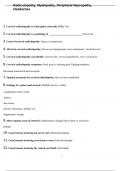
Radiculopathy, Myelopathy, Peripheral Neuropathy, Headaches
Radiculopathy, Myelopathy, Peripheral Neuropathy, Headaches
- Exam (elaborations)
- • 12 pages •
Radiculopathy, Myelopathy, Peripheral Neuropathy, Headaches
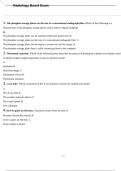
Radiology Board Exam review Que & Answ
1. The phosphor storage plates are the size of a conventional radiograph film: Which of the following is a characteristic of the phosphor storage plates used in indirect digital imaging? A. The phosphor storage plates can be autoclaved between patient use. B. The phosphor storage plates are the size of a conventional radiograph film. C. The phosphor storage plates do not require a scanner to read the image. D. The phosphor storage plates have a cable connecting them to the computer. 2. Th...
- Book
- Exam (elaborations)
- • 89 pages •
1. The phosphor storage plates are the size of a conventional radiograph film: Which of the following is a characteristic of the phosphor storage plates used in indirect digital imaging? A. The phosphor storage plates can be autoclaved between patient use. B. The phosphor storage plates are the size of a conventional radiograph film. C. The phosphor storage plates do not require a scanner to read the image. D. The phosphor storage plates have a cable connecting them to the computer. 2. Th...
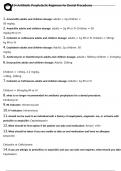
ODM 814 Antibiotic Prophylactic Regimens for Dental Procedures
ODM 814 Antibiotic Prophylactic Regimens for Dental Procedures
- Summary
- • 2 pages •
ODM 814 Antibiotic Prophylactic Regimens for Dental Procedures
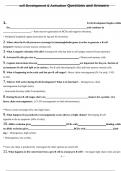
cell Development & Activation Questions and Answers
cell Development & Activation Questions and Answers
- Exam (elaborations)
- • 16 pages •
cell Development & Activation Questions and Answers
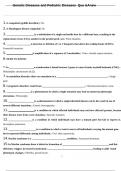
Genetic Diseases and Pediatric Diseases Que &Answ
Genetic Diseases and Pediatric Diseases Que &Answ 1. Is congenital syphilis hereditary: No 2. Is Huntington disease congenital: No 3. is a substitution of a single nucleotide base by a different base, resulting in the replacement of one AA by another in the protein prod- uct.: Point mutation. 4. is insertion or deletion of 1 or 2 basepairs that alters the reading frame of DNA.: Frameshift mutation. 5. is amplification of a sequence of 3 nucleotides.: Trinu- cleotide repeat mutation.
- Book
- Exam (elaborations)
- • 17 pages •
Genetic Diseases and Pediatric Diseases Que &Answ 1. Is congenital syphilis hereditary: No 2. Is Huntington disease congenital: No 3. is a substitution of a single nucleotide base by a different base, resulting in the replacement of one AA by another in the protein prod- uct.: Point mutation. 4. is insertion or deletion of 1 or 2 basepairs that alters the reading frame of DNA.: Frameshift mutation. 5. is amplification of a sequence of 3 nucleotides.: Trinu- cleotide repeat mutation.
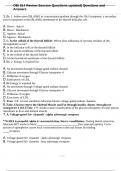
OBI 814 Review Session Questions updated| Questions and Answers
OBI 814 Review Session Questions updated| Questions and Answers 1. D.: 1. Iodine move [BLANK] its concentration gradient through the NA-I symporter, a secondary active transporter at the [BLANK] membrane of the thyroid follicular cell. A. Down : Apical B. Down : Basolateral C. Against: Apical D. Against : Basolateral 2. C. In the colloid of the thyroid follicle: Where does iodination of tyrosine residues of the thyroglobulin occur? A. In the follicular cells of the thyroid follicle B. In...
- Book
- Exam (elaborations)
- • 28 pages •
OBI 814 Review Session Questions updated| Questions and Answers 1. D.: 1. Iodine move [BLANK] its concentration gradient through the NA-I symporter, a secondary active transporter at the [BLANK] membrane of the thyroid follicular cell. A. Down : Apical B. Down : Basolateral C. Against: Apical D. Against : Basolateral 2. C. In the colloid of the thyroid follicle: Where does iodination of tyrosine residues of the thyroglobulin occur? A. In the follicular cells of the thyroid follicle B. In...
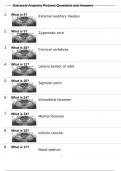
Extraoral Anatomy Pictures Questions and Answers
Extraoral Anatomy Pictures Questions and Answers External auditory meatus
- Exam (elaborations)
- • 42 pages •
Extraoral Anatomy Pictures Questions and Answers External auditory meatus

ANA 534 Exam 6 Diagrams Questions and Answers
ANA 534 Exam 6 Diagrams Questions and Answers
- Exam (elaborations)
- • 14 pages •
ANA 534 Exam 6 Diagrams Questions and Answers
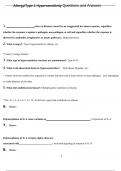
Allergy/Type-1 Hypersensitivity Questions and Answers
Allergy/Type-1 Hypersensitivity Questions and Answers refers to diseases caused by an exaggerated im- mune response, regardless whether the response is against a pathogen, non-pathogen, or self and regardless whether the response is directed by antibodies, lymphocytes or innate pathways.: Hypersensitivity. 2. What is atopy?: Type I hypersensitivity, allergy, etc. **means "strange disease." 3. What type of hypersensitivity reactions are autoimmune?: Type II-IV. 4. What is the theoreti...
- Book
- Exam (elaborations)
- • 7 pages •
Allergy/Type-1 Hypersensitivity Questions and Answers refers to diseases caused by an exaggerated im- mune response, regardless whether the response is against a pathogen, non-pathogen, or self and regardless whether the response is directed by antibodies, lymphocytes or innate pathways.: Hypersensitivity. 2. What is atopy?: Type I hypersensitivity, allergy, etc. **means "strange disease." 3. What type of hypersensitivity reactions are autoimmune?: Type II-IV. 4. What is the theoreti...

Health Ecosystem D391 WGU | Exam Questions, Answers and Summaries